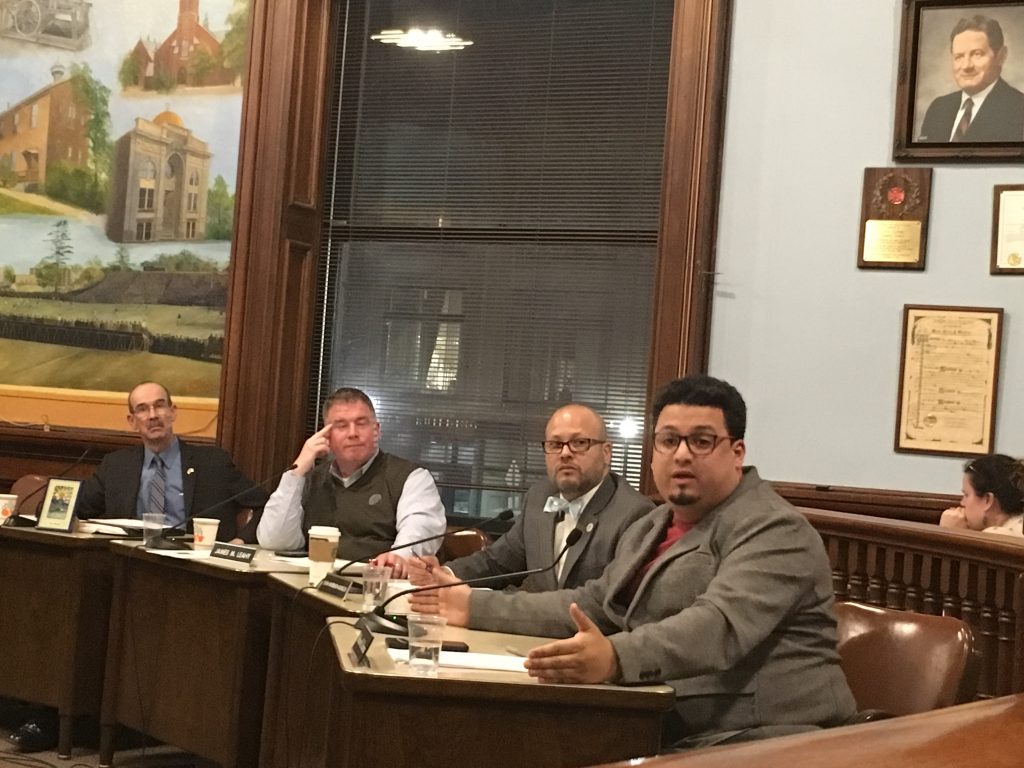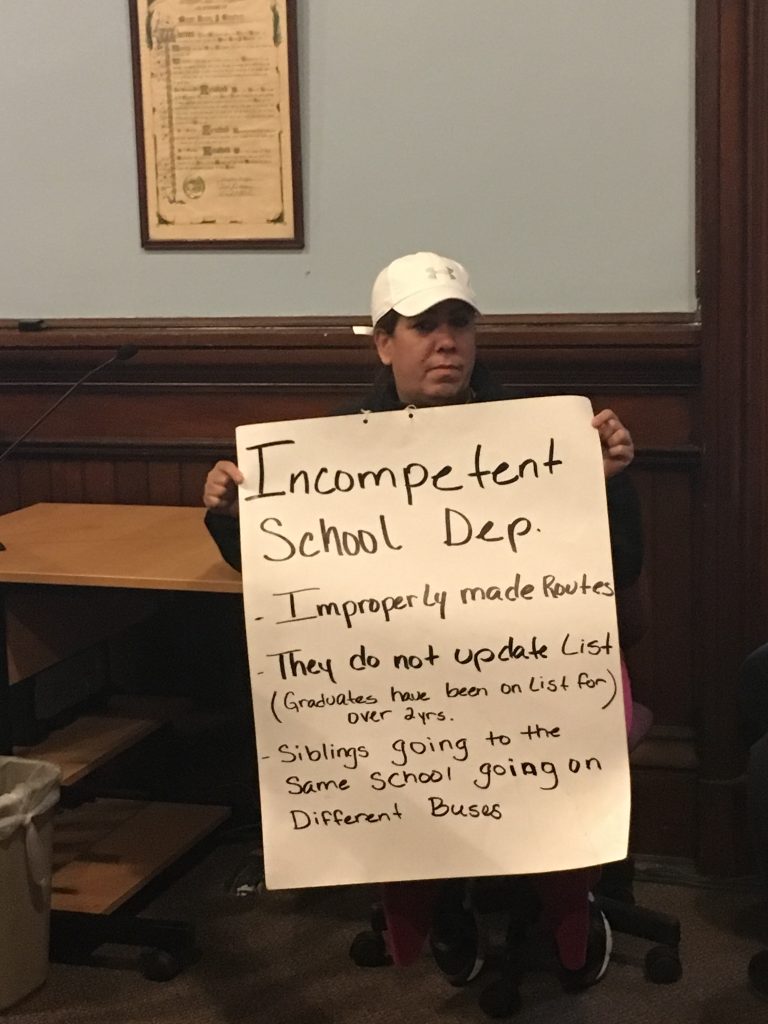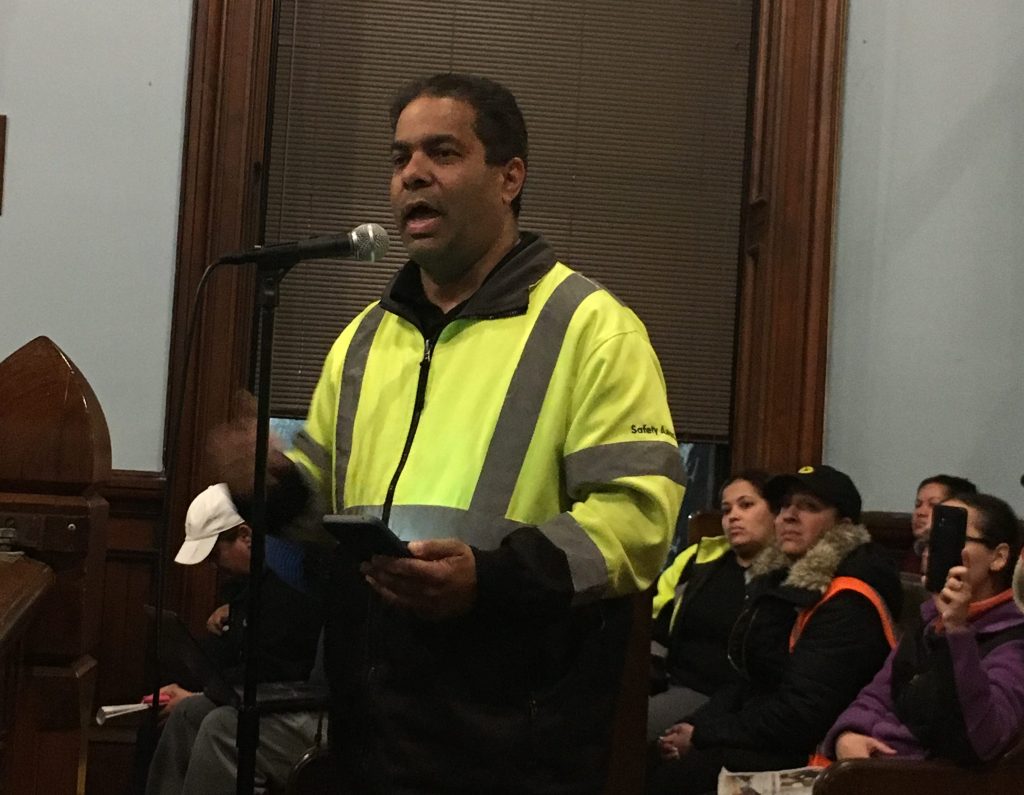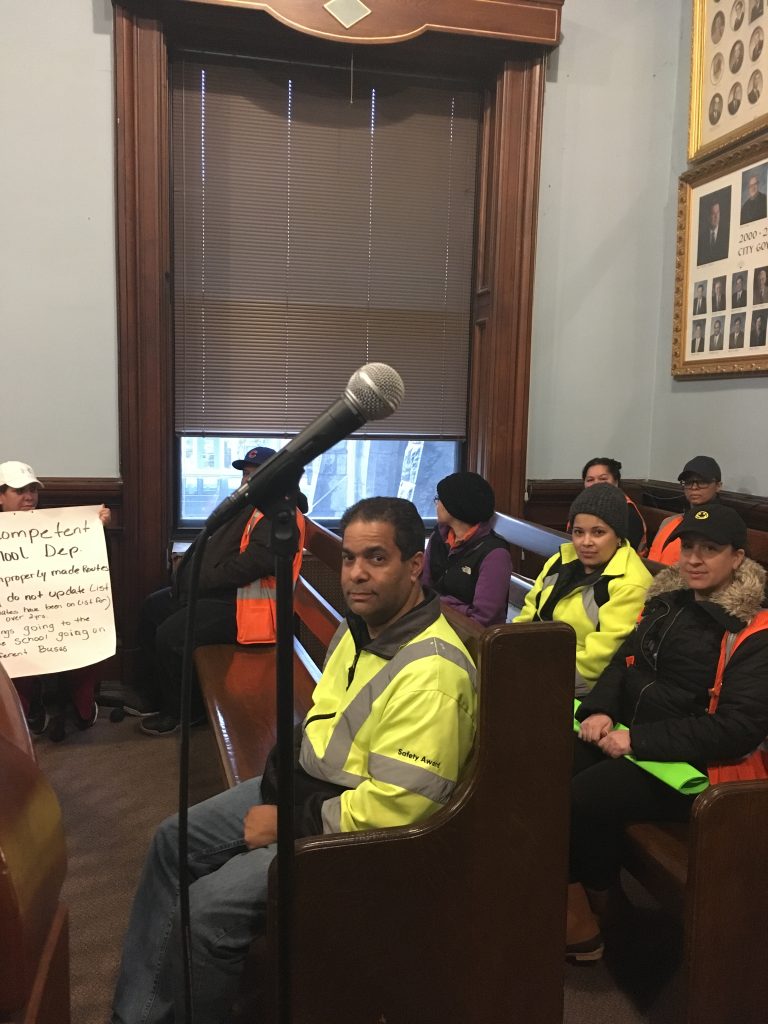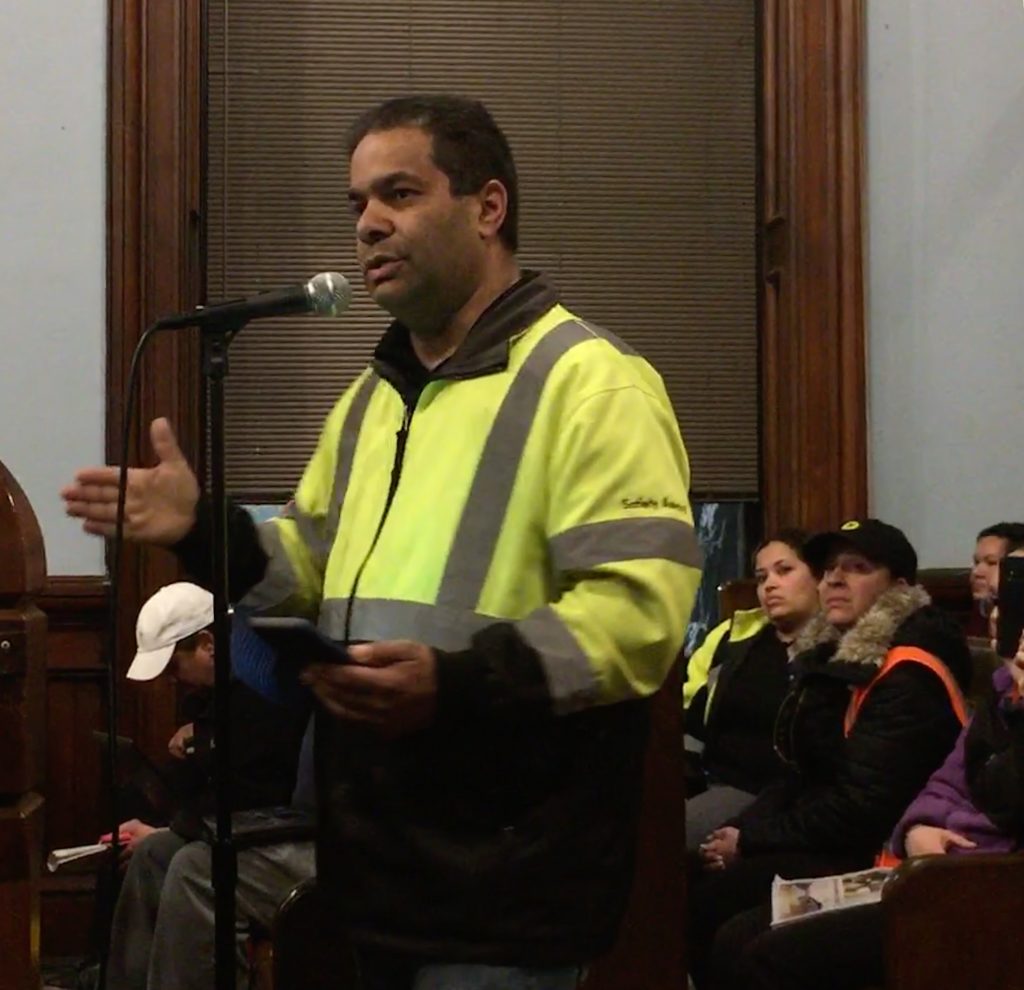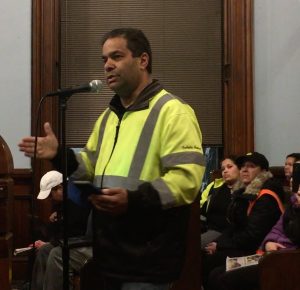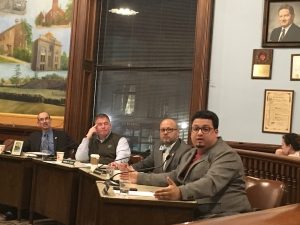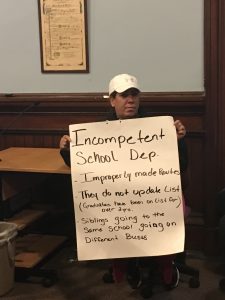When Holyoke Public Schools (HPS) announced in March that they will be changing their special education transportation contract from minibuses to vans, Anna Gonzales was concerned for her son’s well-being.
Gonzales, who lives in Holyoke, has three children who have special needs. Her 10-year-old son is currently transported to and from a public school in Holyoke on a minibus, with the assistance of a bus monitor. For Gonzales and her son, the success of the entire school day can depend on his experience on the bus. Because he suffers from sensory processing issues, he prefers to sit alone on the bus and doesn’t like tight spaces. If he gets upset he can be a danger to himself and those around him.
“The (monitors) are really good with them, we have a good relationship with them,” Gonzales said on April 3. “I understand that they want to save money, but at what cost?”
In early March, HPS bus drivers and many Holyoke city councilors learned that HPS was going to be using school vans through the company Van Pool for special education transport needs instead of continuing to use minibuses. Drivers and monitors who work for the current transportation contractor, Durham School Services, have been met with finger-pointing and confusion at City Council and School Committee meetings where they have shown up to address safety and concerns about losing their jobs.
While getting a job with the new company might be possible, it’s not guaranteed, and many drivers aren’t interested in those positions because Van Pool is non-unionized and wages are reported to be about 40 percent less. One driver reported that seven people have already quit because they fear they will lose their job. There are also concerns that vans are not as safe as minibuses for students.
“As a parent I’d like to make sure that my daughter is brought safely (to school) with a bus driver I know is going to be responsible,” said Maria Gomez, a parent of a HPS student and a driver for the district for 22 years, said in an interview on April 3.
A move to save money
The tension between the need for a school district in receivership to save money and the need to uphold jobs and services was on full display at a heated City Council meeting on Tuesday, April 3. HPS has been under state receivership since April of 2015 due to poor student test scores. Dr. Stephen Zrike, Jr., is the state-appointed receiver and superintendent at HPS and has total authority over the decision-making process for the district in that role.
In a statement on March 2 to city councilors and School Committee members, HPS leadership (including Zrike) said that the decision to change special needs transportation services from minibuses to vans was made by the Transportation Advisory group that consisted of one member of the School Committee, one member of the City Council, the HPS transportation coordinator, the HPS chief of finance and operations, the mayor’s chief of staff, and a member of the city solicitor’s office. Zrike and HPS responded to our request for comment with a copy of their statement.
“This group studied trends and reviewed recommendations made by transportation consultants on best practices for delivering safe special education transportation more effectively and more efficiently,” the statement read. “Had this change been made three years earlier with our existing programs and routing information, it would have saved the City of Holyoke $2 – $2.5 million over the last three years that could have been re-allocated to meet the needs of students in the classroom.”
For many of the drivers with commercial driving licenses, a potential job with Van Pool is of little comfort. Van Pool drivers are not unionized and because driving the vehicles do not require a commercial drivers license, many current drivers are worried that they would see a significant reduction in pay.
Current HPS bus driver David Pares said that at a Van Pool job fair he saw bus monitor positions being offered for $14 per hour compared to the $25 per hour monitors now make. Van Pool was contacted but did not respond before publishing. Pares said that he feels bad for the drivers of Van Pool who might not realize the responsibility they have.
“If anything happens to those kids in those vans, you could go to jail,” Pares said. “If they knew this they wouldn’t be getting paid $14 dollars an hour. Anything happens and you’re career is jeopardized. Your whole life is.”
Frustration over the process
Pares said in an interview on April 3 that more than anything he has been frustrated by how Holyoke officials have handled the issue. Public school transportation contracts change every three years through a public bidding process, but because transporting special education students is not included in this requirement by state law, the Holyoke School Committee and other members of a joint committee were able to decide on a contract change for special needs transportation without public input.
“There were no public meetings and no driver input,” Burke said. “It was just, ‘We can save more money by replacing the special education transportation with vans.’”
In the statement from HPS, representatives from the district said that the bidding process doesn’t always result in the best price for the city because certain companies are not allowed to bid on just a portion of the transportation (like special education transportation) and must bid on the whole contract. HPS reported that not being able to get the best price cost the city of Holyoke hundreds of thousands of dollars in the last three years alone.
Protesters have attended several city meetings where they have reportedly been told different stories about who is to blame for the changes and who they should talk to about potentially preventing the change from going through. At the April 3 City Council meeting, City Councilor Nelson Roman from District 2 said that despite the Council’s yearly request for budget cuts across all departments, he does not approve this contract change.
“We face a deficit every year but I will never put it on the backs of our kids,” Roman said. “We don’t like this process or the way this was approved.”
Roman said that he was not informed about the change until the public was informed, even though City Council President Todd McGee was on the committee that made the decision. Roman also said that only the receiver, Zrike, and Mayor Alex Morse, have the power to stop the change from happening.
Morse did not respond to a request for comment.
At the meeting, many drivers and parents mentioned that they believe that there are cost-cutting measures to be made within the current contract and that HPS has been notified of redundancies on the bus routes.
“We’re doing what we’re told; it’s the school that needs to fix the runs,” said Kathy Galarza, a Holyoke driver since 1997. “You fix it over there and you’ll save your money.”
Councilor Roman’s proposals to send this topic back into joint committee for discussion and to send a communication to the mayor imploring him not to impose this new contract were ultimately tabled for the next full Council meeting on April 17.
A feared reduction in safety
Many parents and bus drivers who spoke at the Holyoke City Council meeting on April 3 wanted someone to hear their concerns about the safety of the proposed vans.
“Our vehicles are designed to take a hit,” said Maria Gomez, who is a driver and a parent. “They are more comfortable and have a lot of emergency exits. They’re more safe in case of an accident.”
Gomez has a Commercial Driver’s License, which is required in order to drive any of the current buses. Van Pool transport vehicles are classified under Massachusetts law as 7D vehicles, which, according to the Registry of Motor Vehicles, require an additional certification to drive, but not an additional license.
David Pares is another driver with a commercial driving license who attended the meeting on April 3. He said that the training they receive for the commercial driving license is far more extensive than what is required to drive a 7D vehicle.
“Our minibuses are built by federal regulation and the kind of training we get is enormous,” Pares said.
HPS addressed some of these concerns in their statement in early March, writing that 7D vehicles are inspected three times a year and are used in schools throughout the Commonwealth. They also addressed the confusion that bus monitors were going to be eliminated and clarified that buses and students that still need monitors will still have them.
“It has been brought to our attention that there are some concerns about this change, including the safety of these vehicles. HPS wants to be clear that our students will remain safe,” the statement read.
In December 2017 the National Association of State Directors of Pupil Transportation Services, which has a membership that represents all 50 states, released a position paper recommending that all school children should be transported in school buses, not full-sized vans that do not meet stringent safety specifications recommended by the federal government. Massachusetts has its own set of guidelines for 7D vehicles.
Losing a union job
In addition to safety concerns, many drivers and monitors who have been protesting the change are concerned about losing their jobs. Patrick Burke is an organizer with UFCW local 1459 in Springfield, the union that represents about 170 bus drivers and monitors who are contracted through HPS. Burke said that because Van Pool has not promised to honor existing contracts, 130 to 150 people could be laid off.
“We don’t have any agreement from Van Pool to honor the existing contract or to rehire any of our members,” Burke said. “It’s possible that our members could apply to work for Van Pool in Holyoke or in other districts but that is not a guarantee of any sort to keep their jobs. In addition, it is the school department that requests a contractor use monitors on their vehicles and the district has not told us how many monitors they expect will be needed in the coming school year.”
In their statement, representatives from HPS stated that they expected there would be even more jobs than there currently are as a result of the change.
“If routing is consistent with this year, we will be adding 10 more driver jobs and 10 more bus monitor jobs to our fleet. Although these are not Holyoke Public School employees and they are employed by the transportation provider, we feel it is important to state the fact that there will be more job opportunities available as a result of this new model,” the statement said.
Meg Bantle can be reached at mbantle@valleyadvocate.com.

